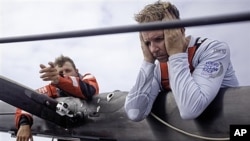One of the toughest, most grueling events in sports offers no prize money, only a trophy. It’s challenging, thrilling and dangerous. And takes a long time.
The Volvo Ocean Race is a marathon sailing event that began Oct. 29 and will not end until next July. Its 11th edition is taking elite sailors and their multi-million dollar yachts on a journey of more than 39,000 nautical miles around the world, in temperatures ranging from -15 to +40 degrees Celsius.
The six Volvo Open 70 yachts all have 11-member international crews, and represent United Arab Emirates, China, France, Spain, New Zealand and the United States.
The commitment to this lengthy event means none of the sailors will likely vie for gold at next year’s London Olympics.
The crew of the Spanish yacht Telefonica features three past Olympic gold medalists. One is Iker Martinez, who skippered Telefonica to victory in the first leg of the Volvo Ocean Race from Alicante, Spain to Cape Town, South Africa.
"We’re happy, that’s something very special for us," he said. "We tried already in the last two editions [of the race] and it didn’t happen as we wanted, but we learned a lot every time. So this is very important for the team. We’re now very happy."
The opening leg took boats west toward the island of Fernando De Noronha off Brazil's coast before heading south across the Atlantic to Cape Town.
In second place after that first leg is Camper. Sponsored by the Spanish footwear brand, it's crewed mostly by New Zealanders. The lone South African member, Mike Pammenter, smashed his face when he was washed down the deck by high seas.
Puma was in the lead at one point in the race, but lost its mast and fell to fifth.
“Nobody’s hurt, nobody was even close to hurt, and then some clear heroics from the crew," said Puma's American skipper Ken Read. "We’ll live to fight another day, I promise you that."
And there are many days yet to come during passage to eight more ports of call. Future stops include The United Arab Emirates, China, New Zealand, Brazil, the United States, Portugal and France, with the race finishing in Galway, Ireland, in early July.
In-port races are being staged at each stop, the closest spectators can get to the action without actually being aboard one of the boats. The second leg of the Volvo Ocean Race is expected to take three weeks, with the sailors aiming to arrive in Abu Dhabi on January 1 of the New Year.





